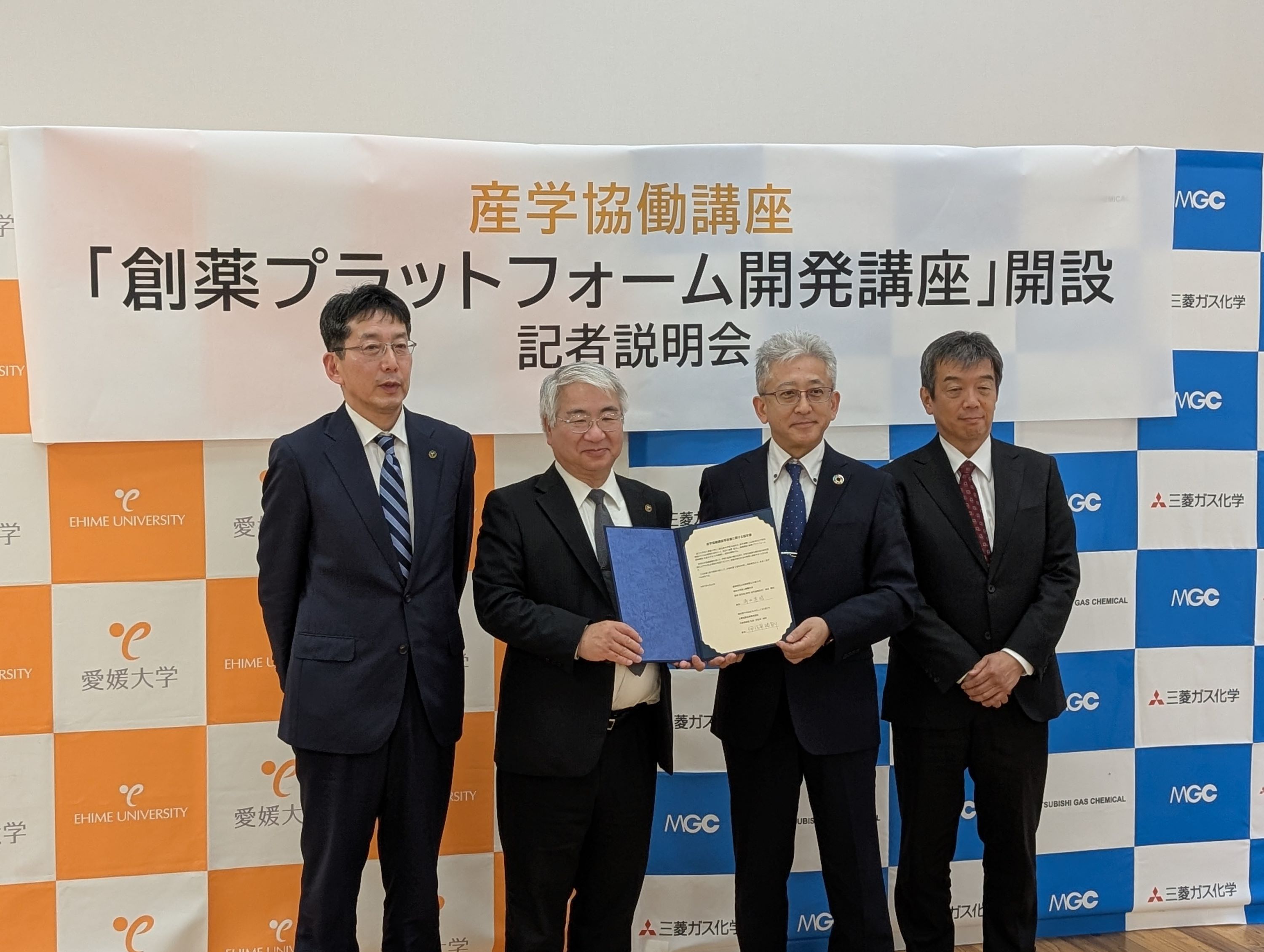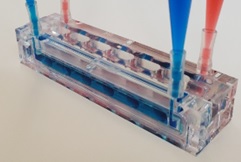Launch of a Drug Discovery Platform Development Program
Clinical Translation of MPS: Meeting the Rising Demand in the Drug Discovery
April 25, 2025
Mitsubishi Gas Chemical Company, Inc. (MGC; Head office: Chiyoda-ku, Tokyo; President: Yoshinori Isahaya) and National University Corporation, Ehime University (Location: Matsuyama City, Ehime Prefecture; President: Hiroshige Nishina) established a "Drug Discovery Platform Development Program" (hereinafter "this Program") in the university's Graduate School of Medicine in April 2025.
In this Program, we aim to promote wider end-user adoption and regulatory acceptance of the drug discovery platform known as the Microphysiological System (MPS), which has gained attention as a promising solution to the challenges faced in modern drug discovery. We will develop human disease models compatible with multimodality*1 to address current drug discovery trends and unmet medical needs.

Press Conference announcing the establishment of Program
In its medium-term management plan “Grow UP 2026”, MGC has set “medical/food” as a prioritized target area and is actively pursuing various initiatives for this area, including those related to rare diseases and personalized medicine. These efforts come under the umbrella of MGC’s Key Issue (Materiality) “promotion of innovative R&D” which is part of Strategy 2 “Build new value through innovation” in Objective 1 “Strengthen the resiliency of our business portfolio” of the plan. With the emergence of new drug modalities, the need to target human-specific diseases, which cannot be fully understood through animal testing, has become increasingly important. Furthermore, conventional static culture systems, such as petri dishes, often fail to accurately replicate the complex mechanisms of action observed in living organisms. As a result, there is a growing demand for innovative approaches that can bridge the gap between pre-clinical animal models and human studies to optimize clinical trials.
MPS is expected to be promising solution to address these challenges. In this Program at Ehime University, we will utilize novel MPS devices that integrate three-dimensional (3D) culture with a multicellular and dynamic microphysiological system to recapitulate the human tumor microenvironment. 3D patient-derived solid tumor cells will be cultured in these MPS devices with immune cells perfused to establish more dynamic and physiologically relevant human disease models. By utilizing these models to evaluate drug efficacy, we aim to accelerate the development of more effective cancer treatments and contribute to the realization of personalized medicine. These devices are being developed through collaboration between MGC and the University of Arizona College of Medicine – Phoenix’s Center for Applied NanoBioscience and Medicine (ANBM).
“This collaborative program will have an impact validating academic discoveries, producing outcomes that could be delivered to the patient, ultimately,” said Dr. Zenhausern, director of ANBM and a professor of Basic Medical Sciences at the University of Arizona College of Medicine – Phoenix. The University of Arizona, a land-grant university with two independently accredited medical schools, ranks among the nation's top public universities, according to U.S. News & World Report.
 The MPS Device Currently in Development
The MPS Device Currently in Development
ANBM has a broad portfolio of health technologies and specializes in the research and development of nanomedicine, next generation drug delivery systems, and chemical technologies. ANBM has long-standing experience in MPS including developing the first human microbiome research tool proving that human-gut MPS can be representative of the actual conditions and processes that occur within human intestines.
MGC, in collaboration with ANBM, will continue its joint development of MPS devices and human tissue models aimed at evaluating and validating the safety, pharmacokinetics, and efficacy of drug candidates more efficiently for more targeted and personalized therapies.
MGC, in collaboration with Ehime University and the University of Arizona, is working toward the establishment of a consortium focused on facilitating the international clinical translation of MPS in the future.
*1 Modality: Methods and approaches related to the foundational techniques in drug discovery, or types of medical devices and pharmaceuticals developed based on those techniques. Multimodality refers to multiple modalities.
[About Ehime University]
Ehime University is the largest comprehensive university in Shikoku, with seven faculties - Faculty of Law and Letters, Faculty of Education, Faculty of Social Co-Creation, Faculty of Science, Faculty of Medicine, Faculty of Engineering, and Faculty of Agriculture - as well as six graduate schools and two interdisciplinary schools, with approximately 10,000 students enrolled.
Ehime University has set the basic philosophy of creating a "student-centered university," "a university that shines together with the community," and "a university that connects with the world," and is engaged in education, research, and social activities that lead the region and contribute to society with a global perspective. As a university based in the community, we aim to contribute to building a sustainable and resilient society through various initiatives aimed at regional revitalization, such as participating in local industries, supporting diverse working styles, utilizing intellectual property, and reevaluating and disseminating local culture, and to demonstrate values and the way society should be as a hub of local knowledge.
For detail, please visit the website ( https://www.ehime-u.ac.jp/en/ ).
END
Inquiries
Public Relations Department
Administrative & Personnel Division
MITSUBISHI GAS CHEMICAL COMPANY, INC.
TEL: +81-3-3283-5040
